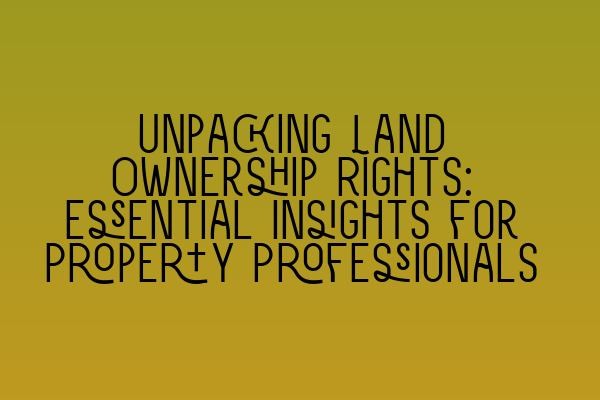Unpacking Land Ownership Rights: Essential Insights for Property Professionals
As a property professional, it is crucial to have a deep understanding of land ownership rights. The legal complexities surrounding land ownership can be overwhelming, but with the right knowledge and expertise, you can navigate through the intricacies of property law with confidence.
In this blog post, we will unravel the key elements of land ownership rights, providing you with essential insights that will empower you in your profession.
1. Fee Simple Absolute
The fee simple absolute is the highest form of land ownership. It grants the owner absolute and indefinite rights to the property. This means that the owner has the right to sell, lease, or transfer the property as they wish. Understanding this fundamental concept is vital for property professionals, as it forms the basis of all land ownership rights.
2. Leasehold
Leasehold is another common form of land ownership. In this arrangement, the owner grants a lease to a tenant for a specified period of time. During this lease period, the tenant has the right to occupy and use the property, but they do not have ownership rights. Leasehold properties often come with certain restrictions and obligations, such as paying rent and maintaining the property. Property professionals must be well-versed in leasehold arrangements to provide sound advice to both landlords and tenants.
3. Easements
Easements are rights granted to a person or entity to use a part of another person’s land for a specific purpose. This could include granting a neighboring property owner the right to access their property through your land, or allowing utility companies to install and maintain infrastructure on your land. Understanding easements is essential for property professionals when considering property development, boundary disputes, or infrastructure projects.
4. Restrictive Covenants
Restrictive covenants are limitations or obligations placed on the use of a property. These restrictions usually arise from agreements made by previous owners or through planning permissions. It is important for property professionals to identify any restrictive covenants that may affect a property, as they can impact the future use and value of the land.
5. Adverse Possession
Adverse possession allows a person who has occupied a property for a specific period of time without the permission of the legal owner to claim ownership. Property professionals must be aware of the legal requirements and timeframes for adverse possession claims, as they can have significant implications for property transactions and disputes.
6. Co-ownership
Co-ownership occurs when two or more individuals jointly own a property. There are different types of co-ownership arrangements, such as joint tenancy and tenancy in common. Understanding these arrangements is crucial for property professionals when advising clients on property purchases, inheritance, or disputes between co-owners.
7. Registered vs. Unregistered Land
In the United Kingdom, land ownership can be registered or unregistered. Registered land is governed by the Land Register, which provides a central record of ownership and other interests in land. Unregistered land, on the other hand, does not have an official record of ownership. Property professionals must understand the differences between registered and unregistered land to ensure proper due diligence and legal compliance in property transactions.
As a property professional, staying up to date with the latest developments and best practices in property law is crucial for success. Keep refining your knowledge and skills through continuously learning and take advantage of resources like SQE courses and exams to enhance your expertise in property law.
For further information on preparing for the SQE exams, you can check out these related articles:
– SQE 1 Practice Exam Questions
– SQE 1 Practice Mocks FLK1 FLK2
– SQE 2 Preparation Courses
– SQE 1 Preparation Courses
– SRA SQE Exam Dates
In conclusion, having a comprehensive understanding of land ownership rights is essential for property professionals. By familiarizing yourself with fee simple absolute, leasehold, easements, restrictive covenants, adverse possession, co-ownership, and registered vs. unregistered land, you will be equipped to navigate through the intricacies of property law with confidence. Stay up to date with the latest developments in the field and make use of SQE courses and exams to continually enhance your expertise.
